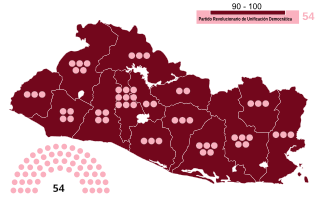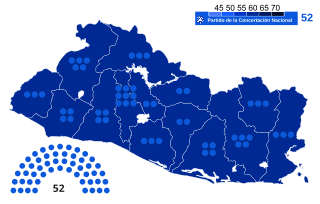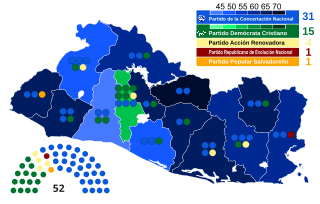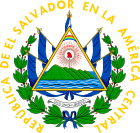
Legislative elections were held in El Salvador on 10 March 1991. The result was a victory for the Nationalist Republican Alliance, which won 39 of the 84 seats. Voter turnout was 44.7%.

Legislative elections were held in El Salvador on 31 March 1985. The result was a victory for the Christian Democratic Party, which won 33 of the 60 seats. Voter turnout was 42%.

General elections were held in El Salvador between 26 and 29 March 1950. The result was a victory for Óscar Osorio in the presidential election, and his Revolutionary Party of Democratic Unification in the legislative election.

Legislative elections were held in El Salvador in March 1952. The result was a victory for the Revolutionary Party of Democratic Unification, which was the only party to contest the elections as the opposition Renovating Action Party claimed that they were rigged.

Legislative elections were held in El Salvador in March 1954. The result was a victory for the Revolutionary Party of Democratic Unification, which was the only party to contest the elections as the opposition Renovating Action Party claimed that they were rigged.

Legislative elections were held in El Salvador on 15 May 1956. The result was a victory for the Revolutionary Party of Democratic Unification, which won all 54 seats.

Legislative elections were held in El Salvador on 24 April 1960. The result was a victory for the Revolutionary Party of Democratic Unification, which won all 54 seats after the Central Electoral Council had disqualified the candidates of the Renovating Action Party in seven of fourteen constituencies.

Constitutional Assembly elections were held in El Salvador on 17 December 1961. The result was a victory for the National Conciliation Party, which won all 54 seats.

Legislative elections were held in El Salvador on 8 March 1964. The result was a victory for the National Conciliation Party, which won 32 of the 52 seats.

Legislative elections were held in El Salvador on 13 March 1966. The result was a victory for the National Conciliation Party, which won 31 of the 52 seats.

Presidential elections were held in El Salvador on 4 March 1956. The result was a victory for José María Lemus of the Revolutionary Party of Democratic Unification, who received 95.2% of the vote.

Presidential elections were held in El Salvador on 30 April 1962. Julio Adalberto Rivera Carballo of the National Conciliation Party was the sole candidate and was elected unopposed.

Presidential elections were held in El Salvador on 5 March 1967. The result was a victory for Fidel Sánchez Hernández of the Party of National Conciliation, who won 54.4 percent of the vote.

Presidential elections were held in El Salvador on 20 February 1972. The result was a victory for Arturo Armando Molina of the Party of National Conciliation (PCN), who received 43% of the vote. However, the election was characterised by massive fraud. The PCN had faced a strong challenge from left- and right-wing opposition, and as a result had tried to rig the election by holding the presidential elections two weeks before the legislative election to ensure that if Molina failed to pass the 50% mark, the Legislative Assembly would still be under PCN control to approve him as president. Despite their attempts to stuff ballot boxes, it looked for a while as though José Napoleón Duarte of the opposition National Opposing Union had been victorious after the Central Election Board in San Salvador issued a statement that Duarte had won by around 6,000 votes. However, this was followed by a three-day news blackout, after which a revised set of figures was announced giving a narrow victory to Molina, meaning that the Legislative Assembly would choose the president. The opposition walked out of the vote, resulting in Molina being elected by 31 votes to zero.

Presidential elections were held in El Salvador between 14 and 16 January 1945. The result was a victory for Salvador Castaneda Castro of the Social Democratic Unification Party. The election was boycotted by five candidates who withdrew after accusing Osmín Aguirre y Salinas of unfair practices to ensure victory for his favoured candidate.

Presidential elections were held in El Salvador between 13 and 15 January 1935. Maximiliano Hernández Martínez was the only candidate and was returned unopposed.
General elections were held in Honduras on 28 March 1971. Voters went to the polls to elect a new President of the Republic and a new Congress. The two main parties, the National Party and Liberal Party, had agreed before the election to split the Congressional seats equally between them, with each party being awarded 32 of the 64 seats. Additional one seat was to be allocated to the winner of the presidential elections as the president was entitled to one seat in parliament, while both parties were to be equally represented in the Supreme Court in all state institutions including the Government. Ramón Ernesto Cruz Uclés of the National Party won the presidential election with 53% of the vote. Approximately 40% out of total of around 900,000 voters abstained from voting at the elections. Some of the major topics at the elections was the issue of commitment to continued participation in the Central American Common Market and approach to the relations with El Salvador after the Football War.

Constituent Assembly elections were held in Honduras on 12 February 1965. The Constituent Assembly subsequently elected Oswaldo López Arellano as president.

General elections were held in Nicaragua on 4 November 1984, to elect a president and parliament. Approximately 1.2 million Nicaraguans voted, representing a 75% turnout, with 94% of eligible voters registered. Impartial observers from international groupings such as the European Economic Community, religious groups sent to monitor the election, and observers from democratic nations such as Canada and Ireland concluded that the elections were generally free and fair.

The vice president of El Salvador is a political position in El Salvador which is elected concurrently with the position of President of El Salvador.













